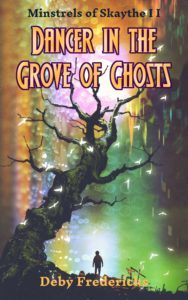Cat Rambo's Blog, page 20
December 25, 2019
End of 2019 $5 Sale
Happy holidays, no matter what form you celebrate them in! Here at Chez Rambo, we mix a lot of traditions, all focused on friendship, food, and lots of lights, the last symbolizing our determination to keep shining brightly in 2020.
To celebrate, here’s the special end of the holidays sale, starting NOW and going through midnight of January 1, 2020. After that the coupon code will no longer be valid, alas. Stock up now!
Every on-demand class in the Rambo Academy is on sale for $5. Here’s the list of classes! The coupon code to use is HOLIDAYDAZE. If there’s any trouble, drop me an e-mail. That coupon is good on every on-demand class, so even if you stocked up on them last year, you’ll find some new to 2019.
Character Building Workshop: How to Create Characters That Are Likable, Engaging, and Keep a Reader Glued to the Page
Deep Dive into Neopronouns: An introduction to neopronouns, how to write with them, and special considerations
Description and Delivering Information for Genre Writers: How to Deliver Information and Build a World Without Slowing Down Your Story
Dunking Your Read in the Details: Toolsets for Creating an Immersive World
Writing Flash Fiction: How to Write and Sell Flash Fiction
Hex Engines & Spell-Slingers: How to Write Steampunk and Weird Western
Literary Techniques for Genre Writers: How to Use Literary Techniques to Take Your Work to the Next Level
Moving From Idea to Finished Draft: How to Turn Any Idea into an Actual Story
Old Stories Into New: Retelling Fairy Tales, Myths, Legends, and Other Narratives
The Power of Words: Everything Fantasy and Science Fiction Writers Need to Know about Linguistics at the World-building and Prose Level
Reading to an Audience Workshop: How to Read Your Work to Other People and Make They Enjoy It
Rewriting, Revising, and Fine-Tuning Your Fiction: How to Make Your Story Better
To Space Opera and Beyond with Ann Leckie: Learn how to plot and write your own space opera works with one of the masters of the field
Writing in the Cracks: https://catrambo.teachable.com/p/writing-in-the-cracks
Want to spend a little on yourself or still need a present for someone? The holiday bundles are good through the end of the sale.
Bonus offer for careful readers: Buy everything and get $20 off all live classes while registering between now and Jan 1. To redeem, mention this offer and the email that you used to sign up for the Academy. Offer can be used with the special Patreon/student rate. Here is the list of upcoming live classes.
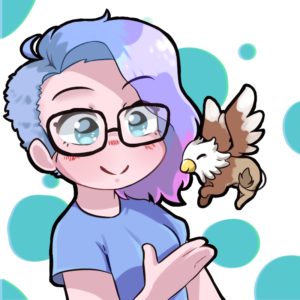 If you’ve enjoyed the Rambo Academy’s offerings over the past decade, please share word of this sale with others who might be interested: your writers group, your own newsletter and fans, that friend you write with, or the students you want to encourage. And please let me know by dropping a comment or mailing me if there are classes or teachers you want to see, particularly for the live classes.
If you’ve enjoyed the Rambo Academy’s offerings over the past decade, please share word of this sale with others who might be interested: your writers group, your own newsletter and fans, that friend you write with, or the students you want to encourage. And please let me know by dropping a comment or mailing me if there are classes or teachers you want to see, particularly for the live classes.
Thanks, everyone, for a stellar year for the Rambo Academy for Wayward Writers, which is now a decade old. While this year has had its share of ups and downs, teaching and the connections I made through it have provided many of its joys. And I’m looking forward to some cool new upcoming classes as well.
Celebrate your holidays with sparkle and shine, but also with compassion for those who are scraping by this season. Give a stranger a smile, at the very least, or a sympathetic ear. Send out joy into the world and it will come back to you tenfold.
Here’s to 2020, with love,
Cat
December 24, 2019
Guest Post: Deby Fredericks on What Are We Fighting For?
I joked recently that it seems like every story has to end with some gigantic battle. That’s how we know it’s the end, right?
Think about it. Which of the world’s great legends tell us that our problems should be addressed through something OTHER than violence?
Hercules, Beowulf and Gilgamesh all killed monsters. King Arthur’s knights in shining armor maintained the peace by fighting monsters. If no monster was about, they would fight each other to catch a lady’s eye. Lord of the Rings featured massive battles for the fate of the world. Military SF, of course, features more technologically advanced weaponry in exotic settings, but the role of the warriors remains the same. It seems the only way to “save” anything is through battle.
Then you get to other forms, like comic books. Superheroes level cities to bring in the bad guys. For this, we admire them. In gaming, the only way to get XP and level up is by killing things. Very few games award XP for clever solutions that avoid combat. Then there are movies, where we may move from combat to combat without time to think. The more explosions, the better!
It’s true that the world can be violent. Depicting violence in stories could be seen as mere honesty. Although, it’s hard to believe that most of us experience that much violence personally, in our daily lives. Not in proportion to the amount of violence we consume as entertainment.
Or perhaps the violence in storytelling is a form of wish fulfilment. As a teacher, I’m well aware of how much time we spend teaching kids NOT to solve their problems with their fists. Watching an animated fight could be viewed as a safe release for dark impulses.
Nevertheless, I was startled to realize how often I, myself, built in a gigantic battle to settle things at the ends of my stories. It wasn’t something I had really thought about. In the accepted frameworks, that’s the way it’s supposed to be done.
Still, it became my personal challenge to write stories where characters solve their problems in some other way than through battle.
For the past two years, I’ve been working on a novella series, Minstrels of Skaythe, where the protagonists try to live peacefully in a dark and dangerous world. In Skaythe, the evil mage Dar-Gothul is an absolute ruler who has twisted the world in his image. Mages are the ruling class, whose magical power gives them the right to do whatever they wish. Selfishness and betrayal are “good.” Showing concern for others is “bad.” My good mages quietly move through the land, disguised as minstrels. They share moments of peace and harmony through their arts. For this, they are branded as renegades.
In the first novella, The Tower in the Mist, one of the minstrels is arrested for the crime of singing a love song. Keilos doesn’t fight back, but instead reacts with basic courtesy. The hunter-guards, led by Sergeant Zathi, are genuinely freaked out by his strange behavior. Captors and captive have adventures that require them to work together, but not all of the hunter-guards can let go of their assumptions about what’s “good” and “bad.”
In the second novella, Dancer in the Grove of Ghosts, Tisha is a gifted healer. She’s decided to undo a curse cast by Dar-Gothull himself. On the way there, she encounters a gravely wounded guardsman. Common sense would say Cylass is her enemy. It’s sheer folly to help him, but Tisha follows her own moral code. Devoted to peace, she tries to show Cylass a different path — and risks betrayal by the one she saved.
While writing it, I played with the idea that comrades on a quest always have a strong bond of friendship and are working for a common goal. Setting them so much at odds brought a deeper tension to the tale.
Currently I’m in revisions of a third novella, The Ice Witch of Fang Marsh. Here I directly countered the idea that the tale has to end in a gigantic battle. I built the story toward that typical climax, but then the two antagonists talked, instead.
I have to say, the ending as written feels… weird. Like the conflict isn’t really over. My beta readers both said the same. Not that the ending was bad, or felt forced, just that they hadn’t seen that approach before.
Unsettled as it is, this outcome is what’s true to the characters. They had a previous relationship that allowed them to talk things out. Or maybe it’s that they were two women, with an instinct toward collaboration rather than combat.
Will this ending satisfy anyone besides me? Good question! I’m having a great time with Minstrels of Skaythe, exploring alternatives to the nagging prevalence of violence in storytelling. If you’re up for the challenge of a slightly strange outcome, I hope you’ll check out my novellas, The Tower in the Mist and Dancer in the Grove of Ghosts.
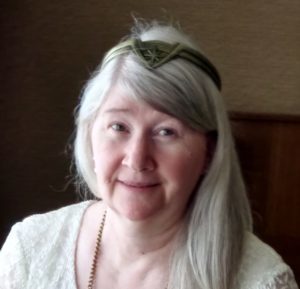 BIO: Deby Fredericks has been a writer all her life, but thought of it as just a fun hobby until the late 1990s. She made her first sale, a children’s poem, in 2000.
BIO: Deby Fredericks has been a writer all her life, but thought of it as just a fun hobby until the late 1990s. She made her first sale, a children’s poem, in 2000.
Fredericks has six fantasy novels out through two small presses. More recently, she self-publishes her fantasy novellas and novelettes, bringing her to 13 books in all. Her latest is The Tower in the Mist. Her short work has been published in Andromeda Spaceways and selected anthologies.
In addition, she writes for children as Lucy D. Ford. Her children’s stories and poems have appeared in magazines such as Boys’ Life, Babybug, Ladybug, and a few anthologies. In the past, she served as Regional Advisor for the Inland Northwest Region of the Society of Children’s Book Writers and Illustrators, International (SCBWI).
You can find out more on her website or follow her on Twitter. Here’s a teaser for her novella Dancer in the Grove of Ghosts, available at Amazon and other retailers:
“He’s dead. He just doesn’t know it yet.”
Mortally wounded, Cylass is abandoned on the battlefield by comrades who would just as soon have him out of the way. But as he waits for death, a strange savior appears. The dancer, Tisha, heals him with her forbidden magic, but also draws the wrath of his cruel former lord.
Soon guardsman and renegade mage are on the run. Will Cylass help Tisha, as she helped him? Or will he do the smart thing, and turn her over to the vicious Count Ar-Dayne?
If you’re an author or other fantasy and science fiction creative, and want to do a guest blog post, please check out the guest blog post guidelines. Or if you’re looking for community from other F&SF writers, sign up for the Rambo Academy for Wayward Writers Critclub!
December 19, 2019
Guest Post: Kyle Winter on The Power of Passive Representation
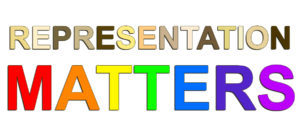 Treading the waters of diversity is tricky because we never want to disrespect the struggles that women, people of color, the LGBTQ community, or others have had to endure. As writers, we often want to include people like this in our stories because their stories are powerful and can make a difference. This sometimes manifests itself as ‘the gay friend’ or ‘the black friend’ or if you’re really batting for a home run ‘the gay black friend’. This character is great for diversity. He shows that those people exist and that we shouldn’t be afraid of them. But over time, if we see the gay black friend over and over it creates a subliminal message that all gay black men behave a certain way, and that can damage the community. I think we should allow those characters to break the mold and keep it to themselves.
Treading the waters of diversity is tricky because we never want to disrespect the struggles that women, people of color, the LGBTQ community, or others have had to endure. As writers, we often want to include people like this in our stories because their stories are powerful and can make a difference. This sometimes manifests itself as ‘the gay friend’ or ‘the black friend’ or if you’re really batting for a home run ‘the gay black friend’. This character is great for diversity. He shows that those people exist and that we shouldn’t be afraid of them. But over time, if we see the gay black friend over and over it creates a subliminal message that all gay black men behave a certain way, and that can damage the community. I think we should allow those characters to break the mold and keep it to themselves.
Gender identity, skin color, and sexual orientation don’t affect your ability to do things. Period. There’s no reason a gay man can’t be a hardened combat veteran and there’s no reason a straight man can’t enjoy ballet. The fact that we use these stereotypes reflects our perceptions of society. It acts as a shorthand for the reader / viewer to go “Oh, he’s the gay guy, I get it!” and we can immediately paint a picture of who that person is without digging any deeper. While it’s great to include someone like this in your story, you may actually do more harm than good by treating them this way. Why? Because you’re adding to society’s confirmation bias. If every time someone sees a gay man on TV or reads about them in a book and they behave like a giddy teenage girl, then we will continue to think that’s how all gay men behave. Not that there’s anything wrong with a flamboyant personality, but it can be an oversimplification of the gay community.
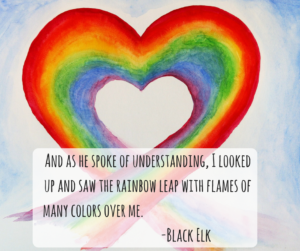
What if, instead, we put a gay man in a position of power? The NBC show Brooklyn 99 does this with the character Captain Raymond Holt. He’s a stoic, calculating man that comes off cold but everyone loves him anyway. Just because he lacks flamboyance doesn’t make him any less gay. He still has a pride flag on his desk and there are many episodes with his husband, but he’s not treated any different because of his sexual preference. Yes, there are some episodes about his struggles as a gay black man in the NYPD because that is a story worth telling, but his skin color and sexual orientation never interfere with his ability to perform his duties. That’s because they literally have no bearing on his performance, and his entire team treats him the same as they treat everyone else. Imagine the impact that has for people who have never met a gay man like him. For some people, it never occurs to them a gay man could behave that way. For some people, that character is eye-opening and possibly life-changing.
Wizards of the Coast, a gaming company that owns Dungeons & Dragons and Magic: The Gathering (among others), often portrays people of color as their flagship heroes. They even have several prominent non-binary characters, which they’ve supported despite friction from some members of the community. Imagine the impact when someone who’s never played one of these games, in an industry that has traditionally been dominated by white dudes, thumbs through one of the rule books and sees a heroic character that looks like them. The imagination stirs as we consider the possibilities of being that character. It makes us feel like we could be part of that adventuring group, part of the epic story that will be written as a legend in years to come. All because of some simple artwork!

Placing these characters front and center, without necessarily making their differences the focus of the narrative, can have a profound effect on society. By having these characters represented in our stories we are saying, “This is how life is, these people exist and they don’t need to be treated any different than you or I.” This silent diversity becomes powerful representation for these communities. It reinforces the idea that we are all equal. If a child sees a hero that looks like them on the cover of a book, or on a movie poster, it tells them they could be that hero. It tells them there are other people with their unique traits in the world and that those people can accomplish great things. It tells them they aren’t alone.
You know what’ll never get old? Seeing representation in games. I used to be one of those people that said it didn’t matter but every time I see someone that looks like me on screen its a feeling like no other. pic.twitter.com/FwdP5rukHE
— ThatBronzeGirl (@ThatBronzeGirl) November 20, 2019
Does this mean you can’t tell a story about a person of color’s struggles? Of course not. Am I suggesting that a woman’s climb to the top of her field isn’t worth hearing about? No. I’m saying that if we fast-forward through the struggles these people face every day and portray them as successful heroes then maybe society will treat them like heroes. In the end, we all want equality. We want a world where our gender identity, skin color, sexual preference or any other part of our being is accepted without a second thought.
Why not nudge society in that direction by telling stories where that is already true?
[image error]BIO: Kyle Winter is an author who is terrible at writing about himself, especially in the third person. He considers himself a genre-fluid author, dabbling in science-fiction, fantasy, pulp and others. He is an avid gamer, whether it be video games, tabletop RPGs, miniatures, board games or card games nothing is safe. For the past nine years he has routinely gotten beat up at his Brazilian jiu-jitsu classes and enjoys every second. You can visit his website www.TheKyleWinter.com or connect with him on Twitter @TheKyleWinter.
If you’re an author or other fantasy and science fiction creative, and want to do a guest blog post, please check out the guest blog post guidelines. Or if you’re looking for community from other F&SF writers, sign up for the Rambo Academy for Wayward Writers Critclub!
December 18, 2019
Some Favorite F&SF Reads of 2019
This is by no means an exhaustive list, but includes many of my favorites.
Ninth House by Leigh Bardugo. The success of Lev Grossman’s The Magicians trilogy has led to quite a few other “college for mages” books. This was my favorite of this year’s batch, although I did also enjoy Sarah Gailey’s Magic for Liars.
Pet by Akwaeke Emezi is a young adult novel that is just extraordinary and beautiful and astounding. I’m about to ship it off to my godkid as well as the next book.
Sal and Gabi Break the Universe by Carlos Hernandez is another young adult novel, this time much more humorous than Pet, but with its sadnesses as well. The voice is funny and delightful while still full of all of the insecurities of high school.

The Twisted Ones by T. Kingfisher is a spin-off from Arthur Machen’s horror work The White Ones and it is, like all of her books, crazy good. It’s weird to me, however, that in 2019, she’s got a hoarder grandmother story, I’ve got a hoarder grandmother story, and Ellen Klages has a hoarder mother story that I enjoyed as well. Something in the zeitgeist?
The Raven Tower by Ann Leckie. It took me a little while to settle into the voice of this book, but once I got with the groove I was totally hooked. Leckie’s a master of storytelling. There’s a lot that’s hopepunk-y about this book, including the casual community-based heroism of the protagonist as well as the insistence on the power and mutability of stories and language.
The Traveling Triple-C Incorporeal Circus by Alanna McFall is actually a book that I edited, so I have a horse in this race, but it is terrific. This reads like a feminist reworking of Beagle’s A Fine and Private Place, and it is a fine and splendid work.
Middlegame by Seanan McGuire is a complicated and interesting book delivered with McGuire’s usual smooth prose and engaging characters. I don’t want to say too much about it for fear of spoilers.
Gideon the Ninth by Tamsyn Muir is like Mervyn Peake’s Gorgmenghast in space with lesbian necromancers. This was a terrific read and (IMO) well worth all the hype. I don’t even know how to describe it but I loved the slow burn of relationship building and the atmosphere and the overall bizarreness of the world. So delightful.
A Song For a New Day by Sarah Pinsker is near-future SF reminisencent of a mash-up of Marge Piercy and Joni Mitchell. This is definitely one of 2019’s hopepunk standouts.
A Choir of Lies by Alexandra Rowland is the follow-up to her amazing A Conspiracy of Truths and it deepens the understanding of the first book in a way that had me going back to read it again. When people are building lists of hopepunk, this and its predecessor definitely should always be included.
Today I am Carey by Martin Shoemaker is a lovely expansion on the award winning story. I really love this piece and it’s very timely.
The Deep by Rivers Soloman (novella) is a fabulous example of how stories can shift forms. Based on a Daveed Diggs by the same name, this is an intense and beautiful translation of the song.
The Fall by Tracy Townsend is the sequel to a book I loved, The Nine, and it was a great continuation of the series, reminiscent of one of my favorite writers, P.C. Hodgell.
The Lesson by Cadwall Turnbull is a fascinating, tightly drawn novel in which humans are forced to co-exist with super-advanced and mostly benevolent aliens, set on the Virgin Islands after the killing of one of the locals by an alien.
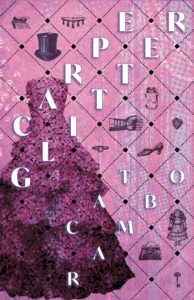 If you’d like to check out something I wrote in 2019, please take a look at modern day fantasy novelette Carpe Glitter! You can find a list of my other 2019 writings here.
If you’d like to check out something I wrote in 2019, please take a look at modern day fantasy novelette Carpe Glitter! You can find a list of my other 2019 writings here.
Want to recommend a 2019 piece that you enjoyed? Please drop it in the comments!
#SFWAPRO
December 17, 2019
Guest Post: Ellie Coverdale on Top Tips for Writing Better LGBT Characters
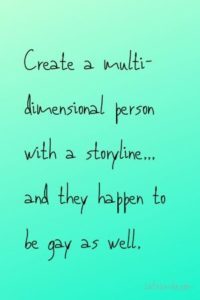 As a writer, it’s normal to want to share stories about the diverse and interesting world around you. That can be difficult if you have to write a character with a completely different background and life experience than you. The important thing is to stay away from writing a stereotype or a character that’s unbelievable. To help you, this article will share five helpful suggestions to create excellent and multi-layered LGBT characters.
As a writer, it’s normal to want to share stories about the diverse and interesting world around you. That can be difficult if you have to write a character with a completely different background and life experience than you. The important thing is to stay away from writing a stereotype or a character that’s unbelievable. To help you, this article will share five helpful suggestions to create excellent and multi-layered LGBT characters.
1. Don’t be stereotypical
In today’s world, producers and audiences alike want to see diversity in books, movies, and TV shows. But creating a stereotypical LGBT character just to fit the demand isn’t good enough. Instead, create a multi-dimensional person with a storyline… and they happen to be gay as well.
According to a writer at Academized and State of Writing, Jamie Lyndham, “a good suggestion is when you’re creating a character, ask yourself if and why they need to be heterosexual or cisgender (identifying with their birth-assigned gender). Think about if you could enhance your story by changing their gender identity or sexuality.”
2. Find a different angle
It can be easy when you’re writing about LGBT characters to develop a dramatic story line like coming out or transitioning. While these issues are important and not to be dismissed lightly, there are a lot of LGBT people in life who are living fun and interesting lives that have nothing to do with their gender or sexuality. It doesn’t always have to be about that.
Think about creating stories for your LGBT characters that are positive, engaging, and not what your audience is expecting. Find a new angle for your story and make your story stand out from others.
3. Research your characters
If you’re not a member of the LGBT community but you want one of your storylines or characters to be specific to this community, you need to do your research. If your storyline concerns a time period before homosexuality was legalized, talk to someone who was around at that time.
This is the best way to make your story, language, and character’s experience ring true for your audience. If you have LGBT friends and colleagues, you might want to talk your ideas through with them to make sure your character is as authentic as any heterosexual character you write.
4. LGBT characters can be in all genres
LGBT people have been around since the beginning of humanity, so you don’t need to only include LGBT characters in modern stories. If you’re writing a period novel, why don’t you consider including an LGBT character, as there are so many great story lines about life before decriminalisation.
Some ideas from Sam Deele, a blogger at Paper Fellows and Australian Help, are for writers to “also write about children with gay parents, or a child that is learning about being transgender. LGBT stories don’t just start when the character become an adult at 18. You can also consider how including an LGBT character could have a positive impact on your audience.”
5. The term trans includes many people
If you’re writing about a trans character, you have to be aware that trans is an umbrella term for many different people, not only someone who was born male but identifies as female and vice versa. Trans actually includes many different people, including those who don’t identify as any given gender, or who are a mix of both, and anything in between.
Don’t fall into any stereotypes here, because writing about trans characters gives you so many new opportunities for different and engaging stories. Like in the first point, think about whether your character needs to be male or female and whether your story could benefit if the character didn’t identify as cisgender.
It’s never too late to ask for feedback, even if you’ve finished the LGBT character or storyline and you want to make sure it’s right. It’s immensely better to make corrections at this stage than to submit it and realize it’s not right afterwards. If you don’t know any LGBT people that can read it for you, look into online groups that promote diversity like Bang2writers who would be happy to help.
 About the Author: Ellie Coverdale, a writer and blogger at Essay roo and UK Writings, loves sharing her writing tips and suggestions with her audience. She writes about many topics including education, life as a writer, and lifestyle tips. She also works as a teacher for Boom Essays in her free time.
About the Author: Ellie Coverdale, a writer and blogger at Essay roo and UK Writings, loves sharing her writing tips and suggestions with her audience. She writes about many topics including education, life as a writer, and lifestyle tips. She also works as a teacher for Boom Essays in her free time.
If you’re an author or other fantasy and science fiction creative, and want to do a guest blog post, please check out the guest blog post guidelines. Or if you’re looking for community from other F&SF writers, sign up for the Rambo Academy for Wayward Writers Critclub!
#sfwapro
December 16, 2019
Free Fiction: Stories Newly Enrolled in Kindle Unlimited
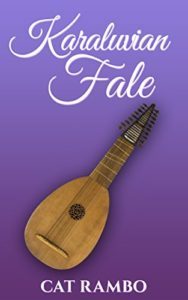 If you’re into short stories and have Kindle Unlimited, I made all of these free:
If you’re into short stories and have Kindle Unlimited, I made all of these free:
Women of Zalanthas are all stories based in the game I used to write for, Armageddon MUD. The game’s still going strong, and you can find it here.
Aquila’s Ring: Aquila Nenyuk finds herself thrust into a world of scheming nobles and political power struggles. When she falls in love with Marius Tor, will he bring her happiness or heartbreak? Originally published in Shadows & Light II.
Karaluvian Fale: Impoverished noble Karaluvian Fale struggles to keep up appearances in the face of Allanaki society, which is all too ready to condemn her. When she has a chance to shape a city-wide festival, will she be able to turn the tables on the families that have mocked the Fales for so long?
Mirabai the Twice-lived: Mirabai is appointed the spiritual leader of her people, despite her extreme youth. She leads them through the decades only to be presented with an unexpected second chance in her later years.
I’ve also made the following available:
Tabat stories include:
Narrative of a Beast’s Life: Taken from his home village, the centaur Fino is enslaved and shipped to a new land, where he must learn to cope with the trainer determined to break him. This short story originally appeared in Realms of Fantasy.
Events at Fort Plentitude: An exiled soldier tries to wait out a winter in a fort beleaguered by fox-spirits and winter demons. Originally appeared in Weird Tales under editor Ann VanderMeer.
How Dogs Came to the New Continent is a short story pulled from the events of the novel Hearts of Tabat, told in the form of a meandering historical paper that teases out more behind the oppression of Beasts and their emerging political struggle.
Her Windowed Eyes, Her Chambered Heart is steampunk horror based on an episode of the old Wild Wild West TV series. Pinkerton agents Artemus West and Elspeth Sorehs have been chasing their prey across the country. When they finally catch up with him near the outskirts of the Cascades, though, they realize he’s gone to ground in a mysterious house that once belonged to his mother, a famous inventor. What secrets hidden in the house will they discover—and how will the house protect its returned son?
Grandmother is space opera with an older female protagonist. Space pirate Phoenix, now retired, finds herself facing an unlikely opponent. Will she and her lover Gareth be able to survive the deadly scheme set up to destroy them and the planet Phoenix rules?
Elsewhere, Within, Elsewhen: On a distant planet, David struggles to overcome his husband’s betrayal, only to encounter an unlikely sympathizer in the form of one of the planet’s native inhabitants. But are its intentions truly benign?
Like these and want me to make other stories available? Review these or drop me a line in the comments!
December 7, 2019
Announcing Rambo Academy Bundles
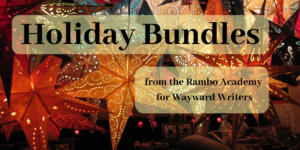 The most recent newsletter just went out but I wanted to underscore an addition that may help you finish off some holiday shopping.
The most recent newsletter just went out but I wanted to underscore an addition that may help you finish off some holiday shopping.
Want to get some Christmas shopping done in the form of gift certificates for Rambo classes? Mail now to reserve your package or request a custom mix. Certificates can be sent in physical form up till December 15 and in virtual form at any point.
Here’s the live classes; here’s the on-demand ones.
Available bundles:
Sampler: One live class and one on-demand class. $49
Community Pass: One year’s access to the Chez Rambo chat server plus one on-demand or live class. $49
Textbook Bundle: One live class plus a signed copy of MOVING FROM IDEA TO DRAFT (or other Rambo title), $99 (USA only)
Two Birds Bundle: Two of the following: a) story/chapter critique (up to 5k words), b) half hour coaching session, c) one on-demand or live class. Can include two of one of the items. $149
Three Birds Bundle: Three of the following: a) story/chapter critique (up to 5k words), b) half hour coaching session, c) one on-demand or live class. Can include multiple sessions of one of the items. $199
Campus Pass: One year’s access to the Chez Rambo chat server plus one live class or coaching session per month for the next year. $499
Guest Class: One custom 2 hour session for your writing group. $399
November 18, 2019
How to Dunk Your Reader in the Details (Figuratively)
 I’m finishing up converting the workshop I did at Surrey International Writers Conference a month or so ago, Dunking Your Readers in the Details, as an on-demand class. That class was in turn based on an hourlong online writing class I did for Greg Wilson’s Twitch channel a few months ago.
I’m finishing up converting the workshop I did at Surrey International Writers Conference a month or so ago, Dunking Your Readers in the Details, as an on-demand class. That class was in turn based on an hourlong online writing class I did for Greg Wilson’s Twitch channel a few months ago.
The class has been fun to put together. Over the course of being taught multiple times, it’s evolved to a point where it presents a dozen tools for writing more immersive worlds, and includes several exercises to allow you to test out the different techniques and see what works for you.
Curious about it? Here’s the section on prioritizing the senses.
A common tool of “Golden Age science fiction” — the late 1930s through the 50s, when science fiction was first coming into its own as a genre — was to invoke all five senses within the first page of a story.
It turns out there’s some science behind that method, in that writing that uses the senses creates more brain activity, setting off mirror neurons. Mirror neurons are neurons that fire under two circumstances: when you are experiencing an event and secondly when you are watching someone else experience it. Writing that invokes the senses makes mirror neurons fire, which makes your reader feel as though they’re experiencing what you are describing.
But beyond that, three of the five senses are more useful to you and should be focused on. Sight and sound will come naturally, and we’re inured to them from watching television and the movies. What you need to push to invoke are smell, taste, and most importantly: touch.
Why is the last the most important? Because touch is more than a question of smooth or rough, velvet versus pebbled. It includes:
◦ Temperature like a chilly breeze, the warmth of a sunbeam
◦ Bodily sensations such as pain, nausea, exhaustion, fever, itches
◦ Motion moments like falling, flying, and floating
When you use these senses in your writing, you are making the reader feel as though they are in the body of the point of view character and experiencing the story world through them. This is a key technique when writing an immersive world.
This class is coming out for Cyber Monday; sign up for the newsletter if you want to make sure you get the special coupon for it!
November 4, 2019
Cat Rambo Award Eligibility for 2019
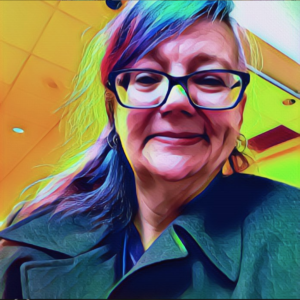 It’s that time of year again when I urge my students and mentees not to be shy about spreading word of the great stuff they’ve done over the course of the year. I’ve blogged before about how important it is particularly for marginalized writers, and you can find my usual round-up of such posts here along with A.C. Wise’s here.
It’s that time of year again when I urge my students and mentees not to be shy about spreading word of the great stuff they’ve done over the course of the year. I’ve blogged before about how important it is particularly for marginalized writers, and you can find my usual round-up of such posts here along with A.C. Wise’s here.
What did I publisher over the course of the year? The thing I’m proudest of is my novelette, CARPE GLITTER, which just came out from Meerkat Press. It is available in both electronic and print form. If you’re reading for awards and need a copy, please let me know.
Other things I had published include:
A Merchant Has Maxims (novella) UNFETTERED III, edited by Shawn Speakman
Big Rural (short story), SOLAR FUTURES
A Hand Extended, (short story), CITIES OF DUST, PLANES OF LIGHT, edited by Todd Sanders
How I Come to Be the Queen of Treacle, (short story), WONDERLAND, edited by Marie Keegan and Paul Kane
Broken all My Boughs and Brittle My Heart (short story), UNLOCKING THE MAGIC, edited by Vivian Caethe
The Chosen One (flash story) Patreon
Neighbors Poem poem, Patreon
April Rain (poem), Patreon
Quick Gulch Poem (poem), Patreon
Nonfiction and other sundry things
Patreon content varied but included things like this story wrangling session, special convention ribbons, and so many pictures of my cat Taco
Video tutorial on researching and evaluating story markets
Video on submitting to story markets
An on-demand flash fiction class
Nonfiction essay for Clarkesworld, Stories That Change the World
Edited political science fiction anthology IF THIS GOES ON
Round-up of Awards Posts by F&SF Writers, Editors, and Publishers for 2019
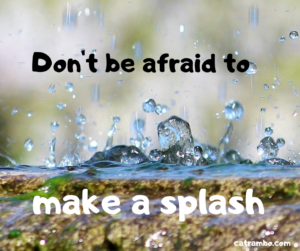 Once again I have created this post for consolidating fantasy and science fiction award eligibility round-ups. Here are the rules.
Once again I have created this post for consolidating fantasy and science fiction award eligibility round-ups. Here are the rules.
I prefer to link to, in order of preference:
Your blog post listing what you published that is eligible
Your social media post listing what you published that is eligible
A single link to the material that is available online
A.C. Wise maintains a similar list here.
Writers (Game and Fiction)
Cat Rambo
Jenny Rae Rappaport
Sameem Siddiqui
A.C. Wise
Editors
Publishers
Atthis Arts
Magazines
Other

